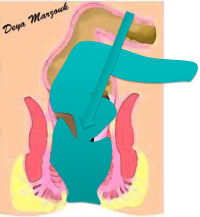|
Surprisingly, surgery for ODS require a great deal of experience to do it well. Experience here falls into 2 fields, clinical experience and operative experience.
A. Experience in examining and assessing patients with ODS. It just needs time and a lot of patients to get the "knack" of knowing what is wrong with patients and how best to deal with it. This is covered to some degree elsewhere.
B. Surgical skills, which need to be developed in a variety of related fields.
- Experience in laparoscopic colorectal resections is becoming essential, not only because of the magnificient views one can obtain with laparoscopy [of the deep pelvis], but also because, this being a benign functional bowel problem, it is much more desirable to have a less invasive operation for these patients.
- The dissection required in many, if not all of these patients is akin to that needed for the construction of pelvic ileal pouches. Surgeons who are not familiar with very deep dissections to the anorectal junctions needed for ileal pouches or colo-anal resections, will not dissect far enough and patients may come back with recureent intussusception / rectocoeles.
- Experience in Per-anal procedures is very handy, when using Trans-STARR type procedures
- Experience in operating in recurrent fields is also important, since many patients had had a hystrectomy, with resultant pelvic adhesions and sometimes altered anatomical landmarks. Other patients may have had previous surgery to the rectovaginal septum for repair of rectocoeles with or without insertion of foreign materials. This increases greatly the difficulty of anterior dissection and also the risks of rectal perforation during such dissection
|

